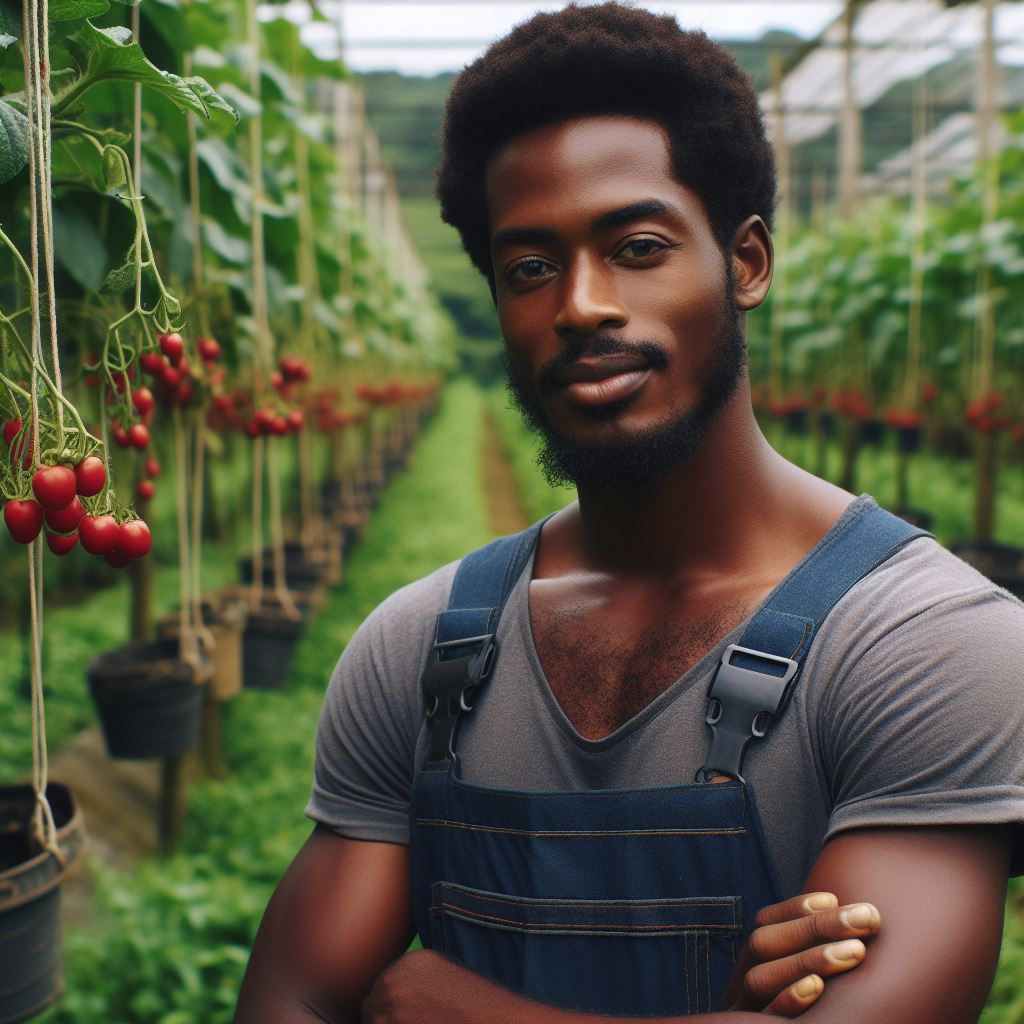Introduction
Nigeria Partners in Crop Safeguarding: Nigeria, with its vast agricultural resources, has recognized the importance of crop safeguarding to ensure food security.
Collaboration among stakeholders plays a crucial role in this endeavor.
Crop safeguarding in Nigeria involves the implementation of measures to protect crops from pests, diseases, adverse weather conditions, and other potential threats.
It encompasses a range of practices, such as integrated pest management, crop rotation, and use of resistant varieties.
The significance of collaborations in crop safeguarding cannot be overstated.
By joining forces, various stakeholders, including farmers, scientists, government agencies, and international organizations, can pool their knowledge, expertise, and resources to develop innovative strategies and tackle the challenges associated with crop protection.
Collaborations enhance information sharing and technology transfer, leading to the adoption of best practices in crop safeguarding.
They facilitate research and development efforts, enabling the identification of emerging threats, the development of effective control measures, and the promotion of sustainable agricultural practices.
Furthermore, collaborations are instrumental in capacity building and training programs, empowering farmers with the skills and knowledge to implement crop safeguarding measures effectively.
They also provide support in terms of funding, equipment, and infrastructure, which are essential for the successful implementation of crop protection initiatives.
In fact, collaborations play a vital role in Nigeria’s crop safeguarding efforts.
By fostering partnerships and promoting synergies among stakeholders, Nigeria can enhance its capacity to protect its agricultural sector, ensure food security, and contribute to the overall development of the nation.
International Collaborations
International collaborations play a crucial role in Nigeria’s efforts to safeguard its crops.
By partnering with research institutions and foreign governments, Nigeria can access valuable knowledge, resources, and support to enhance its crop protection measures.
Collaboration with research institutions
- Partnerships with international agricultural research organizations: Nigeria collaborates with renowned international agricultural research organizations, such as the International Institute of Tropical Agriculture (IITA) and the Food and Agriculture Organization (FAO). These partnerships facilitate knowledge exchange, technical support, and joint initiatives to enhance crop safeguarding.
- Joint research projects for crop safeguarding: Nigeria actively engages in joint research projects with international research institutions. These projects focus on addressing specific crop protection challenges and developing innovative solutions. Collaborative research efforts enable Nigeria to benefit from the expertise, advanced technologies, and funding available through these collaborations.
Collaboration with foreign governments
- Shared practices and policies for crop safeguarding: Nigeria collaborates with foreign governments that excel in crop safeguarding to exchange best practices, policies, and regulations. By learning from successful approaches employed by other countries, Nigeria can strengthen its own crop protection strategies and ensure sustainable agricultural practices.
- Assistance with technology transfer and capacity building: Foreign governments provide valuable assistance to Nigeria in technology transfer and capacity building initiatives. They offer expertise in advanced crop protection technologies, trainings, and workshops to enhance the skills and knowledge of Nigerian farmers, researchers, and policymakers. This collaboration aids in developing a skilled workforce capable of effectively implementing and managing crop safeguarding techniques.
The benefits of international collaborations in crop safeguarding are immense. Nigeria gains access to cutting-edge research, technologies, and resources through partnerships with renowned research institutions.
This, in turn, strengthens the country’s agricultural sector, increases crop productivity, and ensures food security for its growing population.
Collaborations with foreign governments promote a global perspective on crop safeguarding practices.
By sharing experiences and learning from each other, countries can collectively address challenges such as climate change, pests, and diseases that transcend national boundaries.
Nigeria’s collaboration with other governments expands its knowledge base, improves its policy-making capacity, and fosters sustainable agricultural practices.
In short, international collaborations are vital for Nigeria’s crop safeguarding efforts.
By working hand in hand with research institutions and foreign governments, Nigeria can tap into a wide range of resources, expertise, and support to protect its crops effectively.
These collaborations contribute to the country’s agricultural development, food security, and sustainability goals.
Read: Mastering Crop Production: Postgraduate Opportunities in Nigeria
National Collaborations
In Nigeria, crop safeguarding is a crucial aspect of agricultural development, and national collaborations play a significant role in achieving success.
These partnerships involve various agricultural organizations and farmers’ associations that work together to ensure the protection and productivity of Nigeria’s crops.
Collaboration with agricultural organizations
1. Partnerships with local agricultural research institutions
In order to advance crop safeguarding efforts, collaboration with local agricultural research institutions is essential.
These partnerships aim to enhance the understanding of crop diseases, pests, and other challenges faced by Nigerian farmers.
Through joint research projects, training programs, and knowledge sharing, these collaborations contribute to developing effective strategies for crop protection.
2. Cooperative efforts for crop disease surveillance and control
To combat the increasing threat of crop diseases, cooperative efforts between agricultural organizations are established.
These collaborations involve regular monitoring of crops, early detection of diseases, and implementation of appropriate control measures.
By sharing resources, expertise, and information, these partnerships help in minimizing crop losses and preserving agricultural productivity.
Collaboration with farmers’ associations
1. Engaging farmers in crop-safeguarding initiatives
Collaboration with farmers’ associations is critical for the successful implementation of crop safeguarding initiatives.
By involving farmers in decision-making processes and mobilizing their active participation, these collaborations ensure that the strategies developed are practical, sustainable, and tailored to the specific needs of Nigerian farmers.
Through workshops, training sessions, and awareness campaigns, farmers are empowered to actively safeguard their crops.
2. Sharing knowledge and best practices among farmers
Collaborations also focus on knowledge sharing and dissemination of best practices among farmers.
By creating platforms for farmers to exchange ideas, experiences, and solutions, these collaborations enable the adoption of innovative farming techniques, effective pest management strategies, and sustainable methods of crop protection.
This collective learning further strengthens the resilience of Nigerian agriculture against potential threats.
In essence, national collaborations in Nigeria are crucial in safeguarding crops and ensuring agricultural productivity.
Partnerships with agricultural organizations and farmers’ associations contribute to the development of effective strategies, knowledge sharing, and mobilization of farmers.
Together, these collaborations create a dynamic and informed agricultural sector capable of addressing challenges and maintaining the growth and sustainability of Nigerian agriculture.
Transform Your Career with Expert Guidance
Get personalized mentorship consulting that’s tailored to your unique path. Our expert advice is actionable and exclusive.
Get StartedRead: Student Experiences: Pursuing Crop Production in Nigerian Schools

Cooperation with Non-Governmental Organizations (NGOs)
Collaborative projects for crop safeguarding
Non-Governmental Organizations (NGOs) play a crucial role in the collaborative efforts to safeguard crops in Nigeria.
They work in partnership with government agencies to ensure that agricultural practices are sustainable and beneficial to the farmers and the environment.
Through their funding and support, NGOs contribute significantly to research and development activities and assist in implementing crop safeguarding programs.
NGOs working in partnership with government agencies have proven to be effective in addressing the challenges faced in crop safeguarding.
These collaborations leverage the strengths and resources of both sectors, leading to more effective and efficient solutions.
By combining their expertise, NGOs and government agencies can develop targeted strategies to protect crops from pests, diseases, and climate-related issues.
Sustainable agricultural practices are key to crop safeguarding, and NGOs actively participate in joint efforts with government agencies to promote them.
These collaborations focus on implementing practices that minimize environmental impact while maximizing crop yield and quality.
By advocating for sustainable farming techniques, NGOs contribute to the long-term viability of Nigerian agriculture.
Funding and support from NGOs
NGOs provide crucial funding and support for research and development activities related to crop safeguarding.
Their financial contributions enable scientists and researchers to conduct studies and develop innovative solutions to combat pests and diseases.
Additionally, NGOs support capacity building initiatives to enhance the skills and knowledge of agricultural professionals in implementing effective safeguarding measures.
In addition to financial contributions, NGOs also play a vital role in implementing crop safeguarding programs.
They provide hands-on assistance to farmers and communities, helping them adopt best practices and techniques.
NGOs empower farmers through training, field demos, and knowledge-sharing for effective crop safeguarding tools and information.
The collaboration between NGOs and government agencies is the backbone of successful crop safeguarding efforts in Nigeria.
Partnerships unite government and private sectors, leveraging expertise, resources, and networks to develop comprehensive and sustainable approaches for crop protection.
By pooling their efforts, NGOs and government agencies amplify their impact, ensuring the success of crop safeguarding initiatives across the country.
In review, cooperation with non-governmental organizations is essential for effective crop safeguarding in Nigeria.
The collaborative projects between NGOs and government agencies promote sustainable agricultural practices and address challenges in crop protection.
NGOs actively fund and support research, fostering development. They assist farmers in implementing safeguarding programs, ensuring best practices adoption.
Through these collaborations, Nigeria can achieve a more resilient and productive agricultural sector.
Read: Global Influence: How Nigeria’s Crop Production Stands Out
Private Sector Collaborations
Nigeria actively partners with the private sector to safeguard crops, ensuring food security alongside government collaborations.
Private sector collaborations can have a significant impact on the agricultural sector’s ability to protect crops and enhance productivity.
This section will explore two essential types of collaborations in Nigeria’s private sector.
Collaboration with agrochemical companies
Agrochemical companies actively collaborate with Nigeria, contributing to the agricultural sector through shared research and development projects for crop protection.
Agrochemical companies actively invest in researching effective crop protection, advancing agricultural practices in the country.
By collaborating with agrochemical companies, Nigeria gains access to new technologies, innovations, and expertise in crop protection.
Collaborating with the private sector, Nigeria actively updates the agricultural sector on crop safeguarding advancements and implements effective pest management strategies.
Furthermore, collaborative initiatives with agrochemical companies focus on promoting responsible pesticide use.
Nigeria recognizes the importance of using pesticides responsibly to minimize environmental impact and safeguard human health.
Through these collaborations, agrochemical companies provide training, education, and awareness programs to farmers, ensuring they have the knowledge and skills required for appropriate and safe pesticide application.
By working together, Nigeria and agrochemical companies establish guidelines and best practices for pesticide use, ensuring that crops are protected while minimizing potential risks.
Collaboration with food processing and distribution companies
Collaboration with food processing and distribution companies is crucial to ensuring the safety and quality of crop products.
In Nigeria, it is essential to maintain high standards throughout the food supply chain to prevent contamination and uphold consumer confidence.
By partnering with food processing and distribution companies, Nigeria can address potential issues and challenges related to crop safety.
One key area of collaboration is the implementation of measures to combat food adulteration and contamination.
Food processing and distribution companies play a vital role in ensuring that crops are handled, processed, and stored appropriately to prevent contamination and maintain product integrity.
Through cooperative efforts, Nigeria and these companies work together to develop and enforce strict quality control measures.
This collaboration includes regular inspections, testing, and certification to ensure that crop products meet safety standards, reducing the risk of foodborne illnesses and other health hazards.
In a nutshell, collaborations with the private sector, including agrochemical companies and food processing and distribution companies, are essential in Nigeria’s efforts to safeguard crops.
By sharing research and development projects for crop protection, collaborating on responsible pesticide use, and ensuring the safety and quality of crop products, these partnerships contribute to the country’s agricultural productivity and food security.
Nigeria recognizes the value of private sector collaborations and continues to foster and strengthen these partnerships to address challenges and promote sustainable agricultural practices.
Read: From Classroom to Field: Practical Training in Nigerian Universities
Challenges and Opportunities in Collaborations
Identification of common goals and objectives
Collaborations between Nigeria and its partners in crop safeguarding face several challenges and opportunities. One of the key challenges is identifying common goals and objectives.
1. Overcoming differences in perspectives and priorities
Effective collaborations require stakeholders to align their perspectives and priorities. Different organizations and countries may have conflicting interests, making it difficult to establish common goals.
Overcoming these differences is crucial for successful partnerships in crop safeguarding.
2. Aligning efforts towards effective crop safeguarding
Nigeria and its partners must ensure that their collaborations are focused on achieving effective crop safeguarding measures.
It requires alignment of resources, strategies, and actions to address the challenges faced by the agricultural sector.
This alignment can be a complex process but is essential for the success of collaborations.
Enhancing communication and coordination
In addition to common goals, effective communication and coordination are essential for successful collaborations in crop safeguarding.
1. Establishing effective channels for information sharing
To address crop-related challenges, Nigeria and its partners need to establish efficient channels for sharing information.
Timely and accurate information exchange is crucial for identifying emerging threats, developing mitigation strategies, and implementing effective crop safeguarding measures.
2. Strengthening collaboration networks and platforms
Collaboration networks and platforms provide the foundation for effective partnerships in crop safeguarding.
Nigeria and its partners should proactively work on strengthening these networks, fostering relationships, and creating platforms for knowledge exchange, research collaboration, and resource sharing.
By strengthening communication and coordination, Nigeria can tap into the vast expertise and resources of its partners, leading to improved crop protection and enhanced food security.
Ultimately, collaborations in crop safeguarding between Nigeria and its partners present both challenges and opportunities.
Overcoming differences in perspectives and priorities while aligning efforts towards effective safeguarding is essential.
Establishing efficient channels for information sharing and strengthening collaboration networks will contribute to the success of these partnerships.
With concerted efforts and effective collaborations, Nigeria can ensure a sustainable and resilient agricultural sector that can safeguard its crops and ensure food security for its population.
Conclusion
Recap of the importance of collaborations in crop safeguarding
Collaborations play a crucial role in safeguarding crops in Nigeria, enabling the sharing of knowledge, resources, and expertise among different stakeholders.
These collaborations enhance the ability to identify and address crop-related challenges effectively.
By working together, agricultural researchers, farmers, government agencies, and international organizations can develop innovative solutions and best practices.
Collaborations also facilitate the transfer of technologies and advancements in crop protection methods.
This exchange of information helps to improve crop yields, combat pests and diseases, and ensure food security in Nigeria.
Potential benefits and future prospects for collaborations in Nigeria
The potential benefits of collaborations in crop safeguarding in Nigeria are vast.
By pooling resources and expertise, stakeholders can strengthen research and development efforts.
Collaborations can lead to the introduction of new crop varieties that are resistant to pests, diseases, and environmental stressors.
Furthermore, partnerships can improve access to modern farming techniques, training, and equipment.
The future prospects for collaborations in Nigeria look promising as more organizations recognize the importance of working together.
Through sustained collaborations, Nigeria can achieve sustainable agricultural practices, increase crop productivity, and boost rural livelihoods.
Ultimately, these partnerships can contribute to the overall economic development and food security of the nation.




